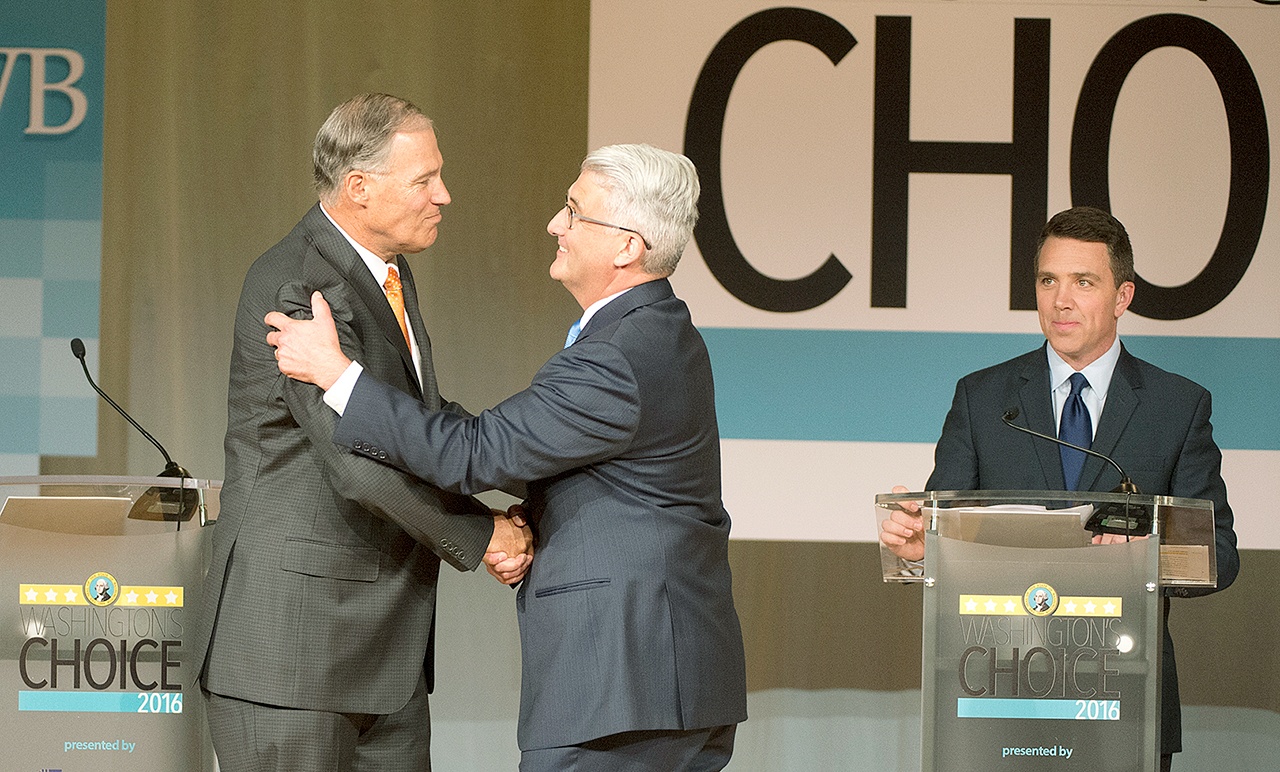SPOKANE — The first debate between Democratic Gov. Jay Inslee and Republican challenger Bill Bryant on Wednesday produced testy exchanges on the minimum wage, Donald Trump and the incumbent’s record.
But it generated no answers on how either intends to ensure public schools are adequately funded, a challenge that looms as the most daunting task facing lawmakers and the next governor in 2017.
In the hour-long event, Inslee spoke of his leadership role in confronting challenges and said he is “more confident and more optimistic” about the state’s future than when he won election in 2012.
“The potential of the state of Washington is unlimited,” he said in his concluding remarks.
Bryant countered with a much different picture, saying the governor’s “rudderless management” has led to four years of failure. Using the metaphor of the state as a campsite, he said Inslee has trashed it and pledged to come in and clean it up.
On education, neither Inslee nor Bryant offered a plan to make sure the state complies with a Supreme Court edict to pay the full cost of a basic education in Washington public schools by 2018.
And when asked about a school levy reform proposal to replace local property tax receipts with state dollars, Inslee and Bryant again balked. Such a swap could cost the state as much as $2 billion more a year.
Inslee, who is seeking a second term, said the state has pumped an additional $2.3 billion into schools to deal with McCleary since he took office. A legislative task force is crafting recommendations on how to raise the money needed to meet the court order, he said.
“We are moving the ball big time. I am glad we’re going to get this job done,” Inslee said.
Bryant called the McCleary decision an opportunity to create a 21st century education system and vowed to bring teachers, parents and lawmakers together to craft a plan to accomplish that.
“I will dedicate my four years to doing this,” he said, criticizing Inslee for not having a plan after four years in office. “For that failure alone you don’t deserve re-election.”
So where would the money come from? Bryant said he didn’t think additional taxes are needed while Inslee said he’s open to closing some tax loopholes to generate revenue. In the past Inslee has suggested creating a capital gains tax but did not in this debate.
Afterwards, Bryant acknowledged the absence of specifics from both candidates and suggested a future debate should focus solely on the subject of education.
“We needed to have a much more substantive conversation,” he said.
The two did tangle on Initiative 1433 on the November ballot to increase the minimum wage to $13.50 an hour by 2020 and provide paid sick leave to all workers.
Inslee said he is “fully supportive” of the measure saying it will give people a living wage and benefit the economy as those workers will have more money in their pockets to spend.
Bryant said he is opposed because an across-the-state hike of that magnitude could force small businesses in rural areas to reduce their workforce to keep operating. Washington’s current minimum wage is $9.47 an hour.
“We’ll be hurting some of the people we’re trying to help,” he said, noting he could support a base wage statewide and adjust it to fit a region’s cost-of-living.
Inslee chided Bryant. “If you’re for a statewide minimum wage, it has to be statewide,” he said.
Much of the debate focused on questions related to economic development and the needs of smaller businesses in counties beyond the Puget Sound.
Some of the biggest sparks came when they posed questions to each other.
Not surprisingly, Inslee focused on Bryant’s protracted refusal to publicly disavow comments and actions of Trump, the Republican presidential nominee. Only Monday did Bryant break his silence, saying he would not vote for Trump.
“You’ve been a candidate for over 242 days,” Inslee began. “What is the virtue or asset that Donald Trump had that led you to say nothing?”
Bryant said it was about loyalty to supporters who feel abandoned by government and think Trump will help them. While Bryant said he disagrees, he didn’t want to be disloyal to them and their feelings.
“This was a very difficult decision. I think I made the right one,” he said. Then, he tried to turn it on the governor.
“You have hidden behind the shield of Mr. Trump and that ends today,” Bryant said.
Inslee rebutted, saying Bryant “wouldn’t say a peep” until he had a poor performance in the primary and a bad poll.
“It was a political decision,” Inslee said.
Inslee, 65, of Bainbridge Island, is a former state lawmaker and congressman. Bryant, 56, who lives in Seattle, is a former Seattle port commissioner and is a founder and co-owner of BCI, an agribusiness consulting firm.
Bryant is trying to become the first Republican elected governor since John Spellman won in 1980. It’s the longest such losing streak for either political party in the nation.
Inslee won the Aug. 2 primary with 49.3 percent followed by Bryant with 38.3 percent. In Snohomish County, the margin was much closer as Inslee collected 46.4 percent to Bryant’s 40.2 percent.
As of Wednesday, the governor held a huge advantage in fundraising. Inslee had raised $7.9 million to Bryant’s $2.6 million, according to online reports of the state Public Disclosure Commission.
Wednesday’s debate at Spokane Falls Community College was sponsored by the Association of Washington Business. It marked the first time the two candidates had shared a stage. Efforts are under way for at least two more debates this fall.
Jerry Cornfield: 360-352-8623; jcornfield@heraldnet.com Twitter: @dospueblos.
Talk to us
> Give us your news tips.
> Send us a letter to the editor.
> More Herald contact information.

























